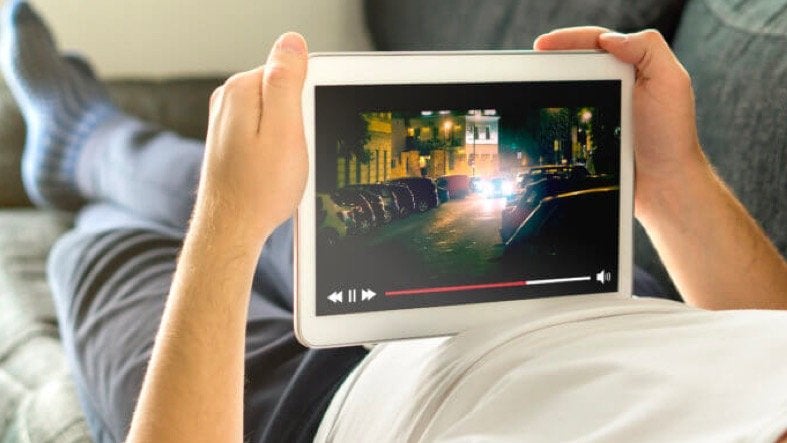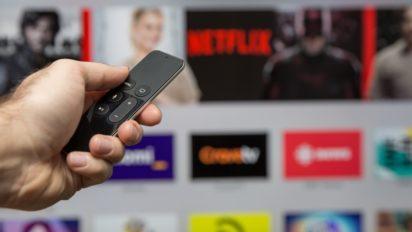When streaming is one of your biggest internet activities, it’s easy to believe that you need the highest speeds your internet service provider has to offer. But before you spring for the most expensive plan you can get, think about the online activities you enjoy and the number of users and devices in your home to see which internet speeds you really need.
Click the links below to jump to a specific section:
- Internet speed for streaming
- Amazon Prime Video
- Disney Plus
- Max (formerly HBO Max)
- Hulu
- Netflix
- 4K streaming
- Live streaming
- What is bandwidth?
- Factors that affect internet speed
- Test your speed
Internet speed requirements for top streaming services
| Service | Recommended speed |
|---|---|
| Netflix HD video | 3 – 5 Mbps |
| Twitch with 1080p and 60 fps | 4 – 6 Mbps |
| Hulu HD video streaming | 3 – 6 Mbps |
| Disney Plus 4K UHD video streaming | 25 Mbps |
Sources: FCC, Twitch, Netflix, Hulu, Disney+
No matter what streaming service you have, you’ll need about 3 Mbps for SD, up to 8 Mbps for HD and around 25 Mbps for 4K UHD streaming. Also, keep in mind that these recommendations are based on a household that’s only running one online activity at a time. The average American household is running six internet-connected devices at once, so it’s wise to spring for more speed just in case.
What internet speed do I need for Amazon Prime Video?
| Video quality | Recommended speed |
|---|---|
| Standard Definition | 1 Mbps |
| High Definition | 3.5 Mbps |
| 4K Ultra HD | 15 Mbps |
Like Netflix, you have three video quality options when watching Amazon Prime Video. For SD streaming, Amazon only requires 1 Mbps. Its recommended speed for HD streaming is only slightly higher at 5 Mbps. Finally, Amazon says you’ll only need 15 Mbps for 4K Ultra HD streaming. That’s on the low side compared to what other streaming services recommend, so we’d recommend factoring in some extra speed if you plan on doing a lot of 4K streaming.
What internet speed do I need for Disney+?
| Video quality | Recommended speed |
|---|---|
| High Definition | 5 Mbps |
| 4K Ultra HD | 25 Mbps |
Disney+ is one of the youngest streaming services around, but its speed requirements mirror the other apps on this list. The only difference is that it doesn’t offer any way to stream in SD. If your internet connection is below 5 Mbps, you might have to deal with some buffering issues when using Disney+.
To stream in HD, Disney Plus recommends 5 Mbps. If you want to stream its large library of 4K movies and TV shows, you’ll need 25 Mbps — the same speed that Netflix recommends.
What internet speed do I need for Max?
| Video quality | Recommended speed |
|---|---|
| High Definition | 5 Mbps |
Max, formerly HBO Max, also doesn’t give you the option to stream in Standard Definition. That means you have two choices: High Definition, of which Max recommends at least 5 Mbps for uninterrupted streaming, and 4k, which Max recommends download speeds of 50 Mbps.
What internet speed do I need for Hulu?
| Video quality | Recommended speed |
|---|---|
| Standard Definition | 1.5 Mbps |
| High Definition (720p) | 3 Mbps |
| High Definition (1080p) | 6 Mbps |
| 4K Ultra HD | 16 Mbps |
All of Hulu’s plans have access to the same video quality, so its speed requirements are a little simpler than those of Netflix. That said, you can still choose between different resolutions on Hulu: Standard Definition (SD), High Definition (HD) and even 4K Ultra HD on Hulu originals.
Hulu recommends 3 Mbps for HD streaming in 720p, 8 Mbps for live streams and 16 Mbps for 4K Ultra HD.
What internet speed do I need for Netflix?
| Plan | Monthly price | Video quality | Recommended speed |
|---|---|---|---|
| Basic | $8.99 | Standard Definition | 3 Mbps |
| Standard | $12.99 | High Definition | 5 Mbps |
| Premium | $15.99 | 4K Ultra HD | 25 Mbps |
Unlike most streaming services, Netflix has three different plans with varying video resolutions, all of which have their own speed requirements. If you subscribe to Netflix’s Basic plan, the service recommends at least 1 Mbps. For it’s the Standard plan, you’ll need to increase that to 5 Mbps. Finally, if you want to stream in 4K on the Premium plan, you’ll want an internet connection that gets at least 15 Mbps speeds.
Internet speed for 4K streaming
Streaming services recommend anywhere between 15 and 50 Mbps for 4K Ultra HD streaming. We recommend erring on the higher side. Because most houses have six devices connected to the internet at once, it’s likely that some of your bandwidth will be going somewhere else, too. Planning for at least 25 Mbps for only your 4K stream should give you a bit of wiggle room.
If you’re still experiencing buffering issues, you can follow some of our troubleshooting steps.
Internet speed for live streaming
| Platform | Upload speed required to broadcast live streams | Download speed required to watch live streams |
|---|---|---|
| Twitch | 3-6 Mbps | 4-6 Mbps |
| YouTube Live | 1-51 Mbps | 1-15 Mbps |
| Facebook Live | 4 Mbps | 5 Mbps |
If you plan on broadcasting your own video out into the world, your internet speed needs will be a little different. In this case, you’ll need to look at your upload speeds, whereas streaming requirements from services like Netflix only deal with your download speeds. (You can learn more about the difference between download and upload speeds.)
Twitch
Twitch recommends 3-6 Mbps upload speeds for broadcasting a live stream. For context, the average upload speed in the U.S. is around 52 Mbps, so most people should have plenty of bandwidth for Twitch streams. If you’re simply watching Twitch streams, you’ll only need 4-6 Mbps download speeds.
YouTube
To broadcast a stream on YouTube Live, upload speed requirements range quite a bit. That’s because you can stream in a number of different video resolutions — 360p at the low end and all the way up to 4K Ultra HD with 60 frames per second. The highest quality would require around 51 Mbps of upload speeds, while the lowest needs as little as 1 Mbps. For most streamers, the answer will be somewhere in the middle.
Facebook Live
Facebook recommends 4 Mbps of upload speeds to broadcast a live stream on its service. It has a maximum resolution of 1080p, so its maximum speed requirements are a lot lower than a platform like YouTube Live.
What is bandwidth and how much do I need?
When talking about internet speeds, you’ll often hear the words “bandwidth” and “Mbps” thrown around. In layman’s terms, bandwidth refers to how quickly you can download and upload data from the internet to your computer. Bandwidth is measured in megabits per second, or Mbps, and the more bandwidth you have, the faster your internet speeds.
The amount of bandwidth you get with your high-speed internet plan is divided amongst all the users and devices in your household, so you’ll need to consider your typical internet activities to know how much bandwidth you need. Keep in mind that activities like streaming and gaming tend to take up more bandwidth than casual web browsing.
Take our quiz to find out how much bandwidth you’ll need to support your online activities.
Five factors that affect internet speed
The speeds you’re receiving and the internet speed you initially paid for won’t always be the same. A number of things can affect your internet speeds at any given time, including who’s using your connection and what they’re using it for.
1. Internet connection type
The types of internet connections that are available in your area will also have a big impact on what speeds are available to your household. Satellite and DSL connections often offer speeds on the lower end of the spectrum while cable or fiber-optic providers offer the fastest.
According to the FCC, satellite connections deliver speeds ranging from 500 Kbps to up to 25 Mbps, while DSL internet connections range from hundreds of Kbps to millions of Mbps. Typical cable internet connections provide speeds ranging from 1.5 Mbps to 2,000 Mbps and fiber-optic internet can exceed cable speeds by tens or hundreds of Mbps.
2. Number of users
There’s a big difference between one person watching Netflix on a 100 Mbps cable plan and five people watching Netflix on that same plan. Your high-speed internet connection only has so much bandwidth to share, and the more people use it, the more susceptible it is to lag.
3. Streaming activities
Not all streaming activities were created equal. Certain activities require more bandwidth and a tell-tale trait of these activities are the speeds they require. Typically, activities with higher recommended internet speeds, like streaming on Twitch, will occupy more bandwidth than an activity like streaming music on Spotify.
4. Connection traffic
“Connection traffic” refers to the competition between devices for bandwidth on your connection. Cable internet subscribers may even be sharing bandwidth with other users in their area. The use of high bandwidth devices like gaming consoles during an inopportune time such as “internet rush hour” can lead to slow speeds for even the smallest households.
5. Internet throttling
In some cases, it’s possible that your internet service provider is limiting your bandwidth or slowing your connection during streaming, gaming and large file downloads. This industry practice, commonly called “throttling,” can also go into effect when a consumer surpasses their monthly data limit.
Test your speed
Try our speed test today to see how your high-speed internet provider’s advertised speeds compare to the speeds you receive. Remember to pause any outstanding internet activity that could skew your results during the test.
Need more for the price?
Try these helpful hacks to improve your internet speed. Or if you just want more bang for your buck, check out providers near you with more speed for the price. Either way, we’ll help you find what you need.
View providers near meRather chat? Give us a call: (844) 451-2720
Rather chat? Give us a call: (844) 451-2720Pro Tip: For best results, use an Ethernet cord to connect your router or modem directly to your device before you run the test.
Get the speed you need
Streaming more than your current internet speeds can handle? Call now to shop the fastest service providers in your area with help from an internet expert.
Written by:
Taylor GadsdenWriter, Broadband Content
Taylor is a veteran member of the Allconnect content team and has spearheaded a number of projects, including a data piece on the top fiber cities in the U.S. and a troubleshooting guide on how to connect your p…
Read more
Edited by:
Trey PaulEditor, Broadband Content
-
Featured
![What you need to stream TV: A beginner’s guide]() What you need to stream TV: A beginner’s guide Joe Supan — 9 min read
What you need to stream TV: A beginner’s guide Joe Supan — 9 min read -
Featured
![5G is on the rise: Is this the tech that will change everything?]() 5G is on the rise: Is this the tech that will change everything? Lisa Iscrupe — 6 min read
5G is on the rise: Is this the tech that will change everything? Lisa Iscrupe — 6 min read -
Featured
![Understand speed test results and learn to boost your internet speed]() Understand speed test results and learn to boost your internet speed Samantha Cossick — 6 min read
Understand speed test results and learn to boost your internet speed Samantha Cossick — 6 min read
Latest
-
Wednesday, April 24, 2024
Why do you need an Optical Terminal Network?Taylor Gadsden — 2 min read
-
Tuesday, April 23, 2024
Worried about losing your TV signal? This is how to keep your satellite dish cleanDavid Anders — 6 min read
-
Tuesday, April 23, 2024
How to change your Wi-Fi network passwordCamryn Smith — 2 min read





